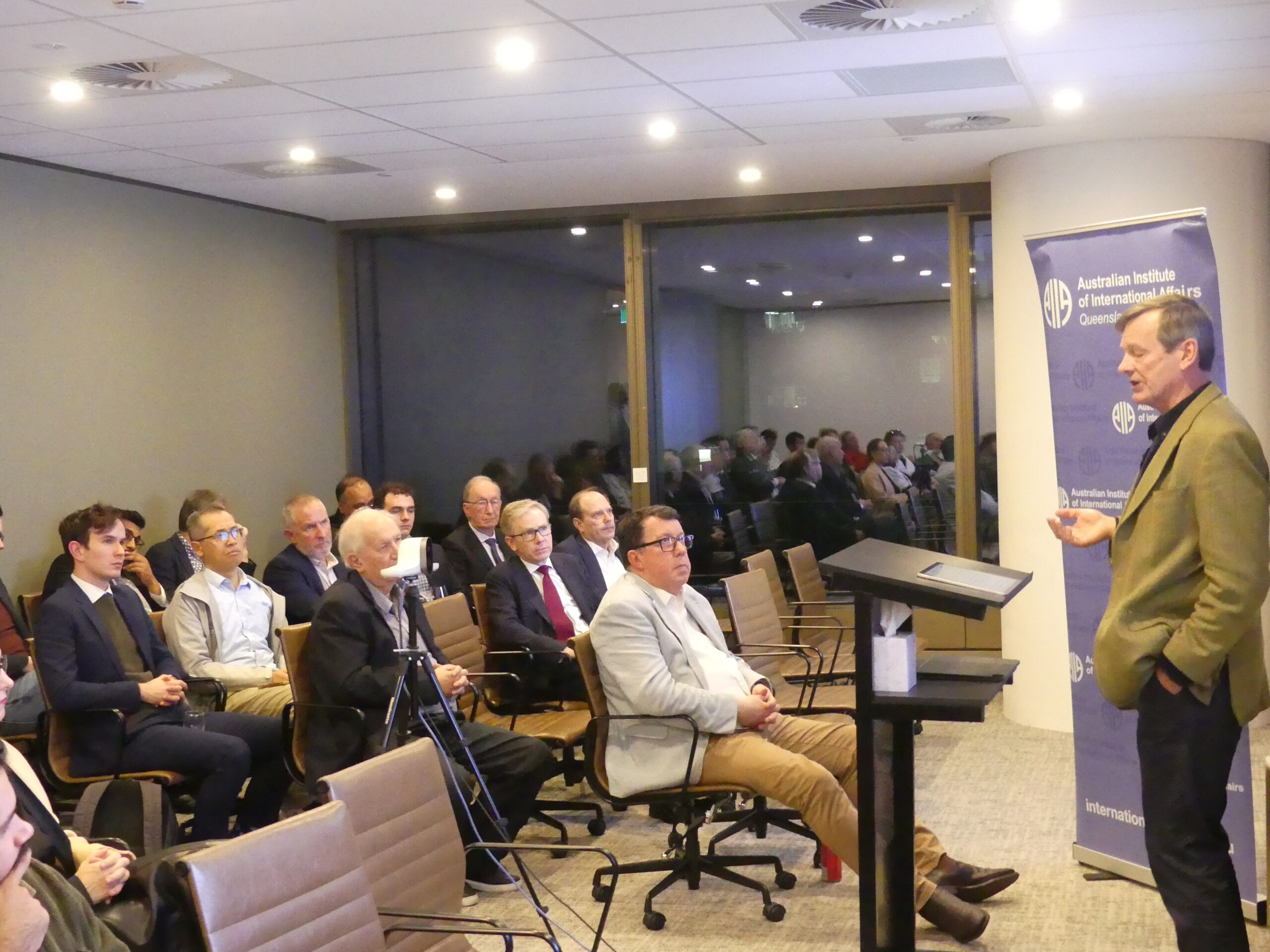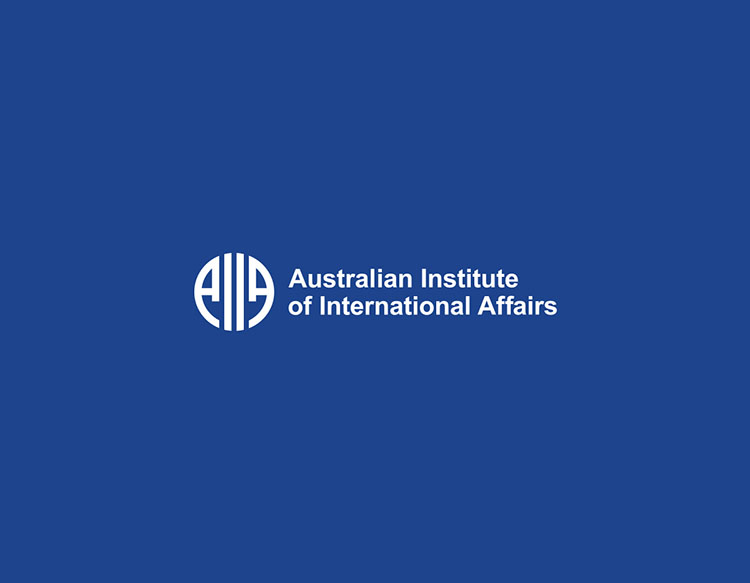In a world marked by rising global tensions and weakening international cooperation, the war in Ukraine has become a key test of the strength of democratic values, the stability of Europe, and the future of international diplomacy. At a recent seminar hosted by the Australian Institute of International Affairs Queensland (AIIAQ), Richard Iron CMG OBE, President of AIIA Victoria and a former British Army officer, gave a talk on Russia’s war in Ukraine. His speech provided a comprehensive analysis of the military stalemate, the historical roots of the conflict, and the challenges facing a peace process.
According to Iron, the goals Russia presents to the outside world, such as stopping Ukraine from joining NATO and gaining control of parts of Ukrainian territory, only represent a partial view of the situation. Beneath these official demands lies a much deeper ambition: to restore Russia’s past power by denying Ukraine its independence, identity, and even its very existence as a nation. Iron explained that President Putin’s thinking is shaped by a strong belief in Russia’s rightful place in history. He often refers to events like the founding of Kievan Rus in 988 AD and the origins of the Russian Orthodox Church to argue that Ukraine has no distinct identity from Russia. In Putin’s view, Ukraine is not truly an independent state but rather a lost segment of a greater Russian civilisation that needs to be reclaimed. This belief, grounded in a misinterpretation of history, helps clarify how far Russia has gone in its actions against Ukraine. The war, Iron argued, is not solely about territory or politics; it is a struggle over national identity and Russia’s role in the world.
This belief, grounded in a distorted interpretation of history, helps clarify the extreme nature of Russia’s actions in Ukraine. As Iron pointed out, Russia is not merely trying to control territory or achieve a military victory; it is actively working to erase Ukrainian identity. This encompasses efforts to suppress the Ukrainian language, culture, and even the notion of Ukraine as a distinct nation. Iron described this as a campaign with genocidal aims, where the objective is not just to defeat Ukraine, but to render it non-existent. If Russia succeeds, he cautioned, Ukraine would not endure as an independent country. This is what distinguishes the war from many recent conflicts. It also clarifies why peace negotiations have faltered. For Russia, agreeing to peace would entail relinquishing what it perceives as a historical mission to restore its former power. For Ukraine, any compromise could entail sacrificing its sovereignty and the right to exist as a nation.
On the battlefield, the war has reached a stalemate. After more than two years of intense fighting, neither side has achieved a clear victory. Russia has made some gains in eastern Ukraine, albeit slowly and at a significant cost. Ukraine, meanwhile, has primarily been on the defensive. It has conducted drone strikes and limited offensives, but these have not resulted in significant strategic changes. Instead, a central element of Ukraine’s strategy now is to make the war so costly for Russia, both in terms of money and lives, that continuing it becomes impossible to justify.
Although the military situation remains stagnant, public support in Ukraine stays strong. Surveys indicate that over 60% of Ukrainians are willing to continue fighting for as long as necessary to protect their country. In Russia, measuring public opinion is trickier, but signs of a growing strain are evident. The economy is under pressure, with high inflation and deteriorating infrastructure, as the Russian government depletes its financial reserves to sustain the war effort. Despite this, most Russians seem to accept the hardship, partly because they depend on the state for wages and pensions, and because political dissent remains perilous under President Putin’s rule.
Iron pointed out that the Russian government has prioritised its military spending while neglecting other sectors of the economy. For instance, the railway system, a crucial element of Russia’s national infrastructure, is facing equipment shortages and a lack of investment. Interest rates remain high, and economic growth has slowed. Although some commentators argue that the Russian economy is adapting, Iron suggested that its current trajectory is not sustainable in the long term.
International support for Ukraine is also evolving. While U.S. assistance remains essential, particularly in areas such as air defence and intelligence sharing, Europe is now playing a significantly larger role. Ukraine has rapidly expanded its domestic weapons production and has developed stronger partnerships with European defence industries. At present, most of Ukraine’s weapons come from within Europe or are made at home. This shift means that Ukraine is less dependent on any single country and that its supporters are becoming more united.
Even so, the influence of former U.S. President Donald Trump still casts a shadow. Iron criticised Trump’s attempt to broker peace during his second term, arguing it was based on a misunderstanding of the conflict. He contended that Trump failed to recognise the depth of Russia’s ambitions and the risks Ukraine faced. Instead of applying pressure on Russia, Trump offered economic rewards and suggested that Ukraine should make concessions to end the war. While the U.S. could pressure Ukraine by threatening to reduce support, it had no similar leverage over Russia. Putin, Iron noted, never seriously engaged with the idea of peace. He pretended to be open to it while continuing his military campaign, likely believing that time would eventually work in his favour.
This belief that time is on Russia’s side is one of the most dangerous assumptions in the war. Putin appears confident that Western countries will grow fatigued from supporting Ukraine, that economic hardship will erode public resolve, and that Ukraine will ultimately be compelled to concede. However, this may be a miscalculation. Russia has already endured significant losses, both in terms of personnel and equipment, and Western sanctions are complicating efforts to replace what has been lost. Meanwhile, Ukraine’s defences are strengthening, and European support is becoming more stable and long-term.
A key part of Iron’s message was his perspective on what lies ahead for Russia. Many people assume that strongmen like Putin will always rule Russia and that its foreign policy will consistently be aggressive. However, Iron reminded the audience that history does not have to repeat itself. Just as Germany changed after World War II, Russia could one day become a peaceful, democratic state as well. For this to occur, however, the current war must thwart the Kremlin’s imperial project. If Putin wins, or even manages to achieve a frozen conflict that preserves his gains, it will only validate his worldview and encourage similar actions in the future.
This is why, Iron stressed, ongoing support for Ukraine is about more than just one country. It’s about safeguarding the values of democracy, sovereignty, and international law. The war serves as a test of whether the global community is ready to defend these principles, even when it proves difficult. Peace, he said, is not merely the absence of fighting; it must be grounded in justice and accountability. Otherwise, it risks becoming nothing more than a pause before the next war.
“For a different Russia to even be possible, first, Putin must be stopped.”
In closing, Iron offered a note of cautious hope. While the current situation remains deeply challenging, change is still possible. Many in the Russian opposition believe in a different future, one where Russia respects its neighbours and embraces democracy. However, that future cannot begin until Putin is stopped. Supporting Ukraine today, Iron concluded, is not just an act of solidarity; it is an investment in the possibility of a more stable and peaceful world.
Edited by Deborah Bouchez
Written by Kiseki Fujisawa
Currently, in her final year of a Juris Doctor at Griffith University, Kiseki Fujisawa is passionate about international law and global affairs. With a strong interest in the intersection of law and diplomacy, Kiseki aspires to promote justice and peace worldwide through legal and diplomatic efforts.


